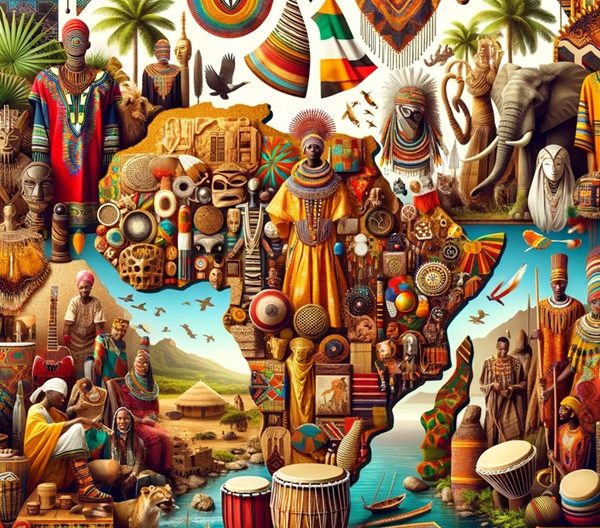
Africa is a continent that has its own deep and rich history, cultural and traditional values. Every country on the continent also has a remarkable history, tradition, culture and history that make the continent different from the rest of the world.
This uniqueness is also reflected in every country’s art, music and dances, languages and literary pieces, proverbs and sports, unique clothing and hairstyles, sports, cooking practices, lifestyle and cultural or religious festivals. As all countries have their own traditions and characteristics that often define that specific region’s beliefs, customs, traditions and identity, Africa is truly a mosaic of vibrant culture, tradition, languages, and cultures. Indigenous African conflict resolution mechanisms are also another important wisdom that is practiced immensely among the peoples of Africa to resolve conflicts peacefully and sustain peace and stability among their peoples.
What is more, as archaeological findings indicate, Africa is considered by most paleoanthropologists to be the oldest inhabited territory on Earth, with human species originating from the continent. And the history of mankind in Africa is older than that on any other continent, which makes it a unique place in human history. According to research conducted by Michael T. Katola (PhD) under the title “Incorporation of traditional African cultural values in the formal education system for development, peace building, and good governance,” African heritage is the history, cultural practices, and beliefs of the people of Africa. It is important to preserve African heritage because it helps Africans to understand their past and where they came from. It also helps us understand their culture and how they relate to each other.
However, it is an undeniable fact that Africa’s rich cultures, histories and norms are being eroded from time to time influenced largely by foreign cultures mostly by western culture and their incalculable importance has been neglected for various reasons.
Especially, most of the African wisdoms- cultures, histories, beliefs, folklores among others were being transformed orally, coupled with the scarcity of written sources are blurring the reality.
Even some of the recorded histories were being written by foreigners instead of Africans themselves, making the matter more complicated and challenging. However, no matter what, preserving Africa’s unique wisdoms- history, culture, tradition, literature, art, music and dance, dressing style and passing on to the next generation is becoming more important now than ever before.
For this reason, many agreed that preserving the rich tapestry of Africans’ histories, cultures, norms, traditional arts, crafts and the like that have been handed down from one generation to another in various forms is of critical importance to ensure that they are not lost bit by bit.
To this end, incorporating African cultural values in the formal education system is fundamental to learn about the past, maintain strong sense of identity and pride, to foster a sense of unity and cohesion within communities and pass on the values to the future generations. In this respect, incorporating culture in Africans educational curricula is one way that can help save the values from eroded.
UNESCO Ethiopia and AU representative Rita Bissoonauth also underscored the importance of incorporating culture in the curricula of African countries as it is instrumental in building resilient communities.
In an exclusive interview with ENA, Bissoonauth said that conserving culture is one of the mandates of UNESCO.
“As UNESCO, one of our priorities in African operational strategy is cultural heritage. Cultural aspects should be incorporated into our curricula.”
According to the representative, if we do not know our culture or our identity, we are all lost in this world. So, it is very important to include culture in our curriculum.
UNESCO, as the only United Nations agency with a core mandate in both culture and education, has plans to embed culture and the arts in and through education as key resources for human development.
“Africa is a continent with an incredibly rich culture, bursting with beauty and diversity. The cultural heritage of the continent is rich and diverse, shaped by thousands of years of history, traditions, and customs,” she remarked.
Cognizant of this, UNESCO is working on protecting and safeguarding the world’s cultural and natural heritages and supporting creativity and dynamic cultural sectors that are fundamental to addressing the challenges of climate change, reducing the level of poverty, inequality, the digital divide, and ever more complex emergencies and conflicts. Accordingly, in the field of culture, UNESCO has promoted the learning of heritage, both tangible and intangible, as a way of broadening perspectives and deepening knowledge about history and society, strengthening heritage protection and transmission, as well as enriching intercultural understanding and the appreciation of cultural diversity.
According to the study, in contemporary Africa, formal education is recognized as a basic prerequisite for development. By implication, the school has become important as a socializing agent. In spite of this, schooling is based on institutions designed to impart specific knowledge and skills, often unrelated to the actual needs of the learners and communities to which they belong.
It is for this reason that the need arises for traditional values to be incorporated into the present formal system of education. The values discussed in the paper are analyzed in the context of John P. Miller’s holistic education theory. It is evident that values can be integrated into the present education system. Africa would realize economic development, peace, and good governance, the study added.
In conclusion, no doubt, incorporating African culture into the education curriculum is a vital step not only to honor the continent’s diverse heritage but also to produce a generation who is equipped with a deeper understanding of their roots and a broader perspective on global issues.
Therefore, the integration of African culture into educational curricula is not just a matter of representation but a fundamental step to safeguard Africa’s heritage, languages, and traditions that define the African continent.
BY LEULSEGED WORKU
The Ethiopian herald July 14/2024





